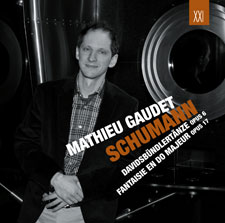Flash version here.
 Mathieu Gaudet, the
piano poet, is a man of ideas and of action. An active social human
being, he throws himself intensely into all spheres of his life, from
his medical practice to his family life. With the piano, he finds solitude
for himself. This month, LSM and XXI-21 Productions are exceptionally
pleased to immerse you, with the company of Gaudet, in the intimate
and sensitive world of Robert Schumann’s piano music. The music of
this great romantic suits Gaudet; it speaks to him. Schumann has fascinated
him for quite a while: his background, his literary references and his
romantic characters. Schumann is one of his absolute favourites, second
only to Bach.
Mathieu Gaudet, the
piano poet, is a man of ideas and of action. An active social human
being, he throws himself intensely into all spheres of his life, from
his medical practice to his family life. With the piano, he finds solitude
for himself. This month, LSM and XXI-21 Productions are exceptionally
pleased to immerse you, with the company of Gaudet, in the intimate
and sensitive world of Robert Schumann’s piano music. The music of
this great romantic suits Gaudet; it speaks to him. Schumann has fascinated
him for quite a while: his background, his literary references and his
romantic characters. Schumann is one of his absolute favourites, second
only to Bach.
First on the program
is the original version of Davidsbündlertänze
(Dances of the League of David), opus 6 from 1837, a real masterpiece
of the imagination in 18 character pieces. In this suite, Schumann presents
an imaginary society (of biblical inspiration), which is committed to
identifying and keeping music of the classical tradition and its masters
alive. He contrasts this tradition to the “philistines of music”,
titleholders of musical complaisance and insipid virtuosity.
The characters he
brings to life come from the Neue Zeitschrift für Musik, a musicological
publication that he helped establish in 1834 and which is still in existence.
Schumann contributed hundreds of articles to it. Schumann’s well-known
alter egos—introspective Eusebius and impetuous Florestan—express
themselves in singular duality. Many contributors also adopted imaginary
characters, thereby preparing the way for a “poetic future” and
for musical critique. In Davidsbündlertänze,
the letters E or F precede all the miniatures, the initials of the sidekicks
who had signed the first edition of the opus. Gaudet emphasizes that,
for him, this refreshing cycle format is linked to the literary world.
The work bears Sehnsucht imprint of internal desire, especially
in the last pieces. All the humorous misunderstandings suggest
at times a gleeful child, in tears.
It may be in the
Fantasy in C major, op. 17 where we dive deepest into Schumann’s
rich and enigmatic world. A major work on a grand scale and continuous
form, it contains an intensity that was able to tell musicologists that
Schumann was a musical fanatic, as others may be “religious fanatics.”1
It exceeds the piano, suggesting a full orchestra. In it, Schumann declares
his passionate love for Clara, his future wife. We hear again the motif
of the descending fifth, in joint movement, referring to the five letters
of her name. Digressions, surreal like a dream, change the traditional
sonata format. The purest light and hope entwine in dark moments. Unstable,
transient, the theme breaks up; the openness of the beginning rondo
is quickly interrupted; fascinating paradoxes overflow in this work.
Gaudet considers this opus to be a synthesis of Beethoven’s and Schumann’s
music, which has the most to offer.
Gaudet leaves us
with the fifth of the posthumous variations published in 1873 as an
addition to the Symphonic Studies, one of Schumann’s most important
piano cycles. These pages were saved by Brahms himself! The question
of their integration to the Symphonic Studies has excited musicologists.
Schumann sadly sunk into madness in 1854. He was committed to the Endenich
Clinic where he remained until his death in July 1856, at the age of
46.
When asked about
the role of competitions in a musician’s career, Gaudet said that
he considers these to be moments for self-exploration. On the whole,
these exciting challenges are powerful work incentives, and can sometimes
be springboards to the international scene. Gaudet is well aware of
this; he participated in the Canadian Music Competition from the age
of 9 to 20, in university and summer camp competitions, and was a semifinalist
of the Montreal International Music Competition in 2004. He stressed
that with competitions, you need the wisdom to know when not to enter,
if you are not fully prepared. The pianist weighs the options; competitions
can seem like the event of a lifetime, but they really teach hard work
and humility.
As time passed, music
became more and more the means by which Gaudet developed the art of
living and which helped him find "the joy in small things"
once again. If you ask how he does all of this, he says "with the
good fortune of staying open. It's important not to get used to life’s
little miracles." Gaudet also works as a volunteer overseas, and
this year will be finishing his residency in family medicine. He believes
that each person is unique and needs to be accommodated: in music as
in medicine, going from theory to practice, from training to performance
where the practice is an art.
Mathieu Gaudet will
join Pentaèdre and Suzie LeBlanc on December 1 for a Viennese Schubertiades
in Ogilvy’s Tudor Hall. Appetizers/wine will be served at 5 p.m.,
and chocolates/port at 8 p.m. 514-398-4547. Gaudet will perform a concert
at Salle Bourgie on January 20 exploring the history of the fugue, with
works by Schumann, Ana Sokolovic, Feininger and J. S. Bach. This show
appears as part of the festival “A Fugue at the Museum” and the
SMCQ (Société de musique contemporaine du Québec) series “Hommage
à Ana Sokolovic.”
Translation: Karine
Poznanski
1 B. François-Sappey,
Robert Schumann, Paris, Fayard, 2000, p. 23
Version française...

